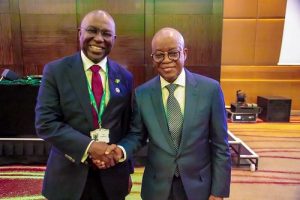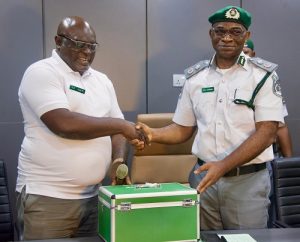Averting Crisis at Ports: Shippers’ Council Meets Freight Forwarders ,MWUN Leaders

CUSTOMS AGENTS PROTEST
By Francis Ugwoke
The Executive Secretary, Nigerian Shippers’ Council (NSC), Mr Emmanuel Jime and his management team are scheduled to hold a meeting with the leadership of the freight forwarders as well as the Maritime Workers Union of Nigeria (MWUN) today in Apapa Lagos.
The meeting which begins this morning with the freight forwarders and later on with the executive members of MWUN according to an official of the ports economic regulator may not be unconnected with burning issues at the ports.
MWUN had issued a statement saying it will call out its members for strike beginning from March 1 next week.
Members of the Association of Licensed Customs Agents (ANLCA) have been at loggerhead with the Nigeria Customs Service (NCS) at the Tin Can Island port over the newly introduced Vehicle Identity Number (VIN) valuation system which has raised duties payable on vehicles by over 300 percent, according to customs agents.
On the other hand, members of the MWUN have threatened to embark on strike over claims of non-compliance with the Extant Stevedoring Regulations, known as Government Marine Notice 106 of 2014 by the oil companies.
Today’s meeting may be to seek ways of addressing the grievances of both freight forwarders and labour leaders to avoid shutdown of activities at the seaports.
Members of the National Association of Government Approved Freight Forwarders (NAGAFF) had on Thursday pulled out of the strike, leaving only members of ANLCA who are insisting on the industrial action.
NAGAFF while backing out of the strike however sent a petition to the operators of Webb Fontaine complaining bitterly about “incessant network failure and inefficiency”.
According to NAGAFF, this has led to losses of revenue by freight forwarders and the federal government.
The protest by the agents which started on February 21 has paralysed activities at the Tin Can Island port.
The National Coordinator, 100 Per Cent Compliance Team, NAGAFF, Alhaji Ibrahim Tanko who noted that the e-valuation by the Customs Service has come to stay added however that it was important to know how the Customs generated the current high value on vehicles was generated.
On why NAGAFF would not want to be part of the strike, he said the already some hoodlums from Ajegunle and Mushin were planning to join freight forwarders in the protest at the Tin Can ports.
He had while addressing newsmen on Wednesday said, “Our eyes and ears are on the ground and we need to protect our people. We had strong information yesterday night about Mushin and Ajegunle boys coming to hijack the protest. The Police and Navy have been alerted and that is why we have to withdraw from the ongoing protest.We can remember what happened to ENDSARS where some people hijacked the peaceful protest and at the end we lost some lives.
This time around we have confirmed that people from Ajegunle and Mushin are already participating in the protest”.
Customs agents said the new policy has led to importers paying as much as N1million duty on one car as against about N200,000 that was the case before.
But the National Public Relations Officer of the Customs, Mr Timi Bomodi in a statement earlier appealed to the customs agents to accept the new VIN regime.
Bomodi claimed the new VIN uses “artificial intelligence:” to make the system transparent.
According to him, the artificial intelligence assembles trade data which represent a range of values that are consistent for each car make and model using VIN.
He explained in the statement, “It is totally devoid of human inputs by NCS officers and enables easy and fast assessments necessary to process duty payments.
“Indeed, time-motion studies confirm a maximum of six hours between automated assessments and release of cars using VIN valuation.
“Following the demands of agents for a simplified system which recognises standard values, NCS is confident that this innovation in clearing process will satisfy the desires of agents clamouring for change.
“The resistance to VIN valuation comes as a surprise seeing that it is deliberately designed to meet their demands. It also compels us to investigate further, the intentions of those protesting its use.
“When our valuation officers gave out ex-factory prices for duty assessment, they were accused of collecting monetary inducements to give lower values. It will be interesting to know what these same agents/importers will accuse the machines of discrimination based on non-digital considerations”.
The PRO said those protesting against the new VIN do not care about “automation, simplification, harmonization” and transparency involved.





